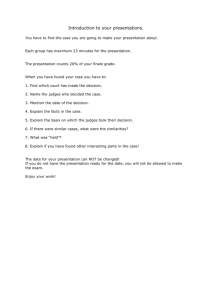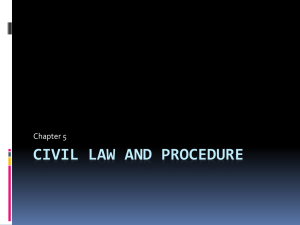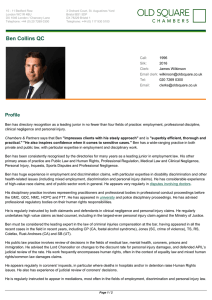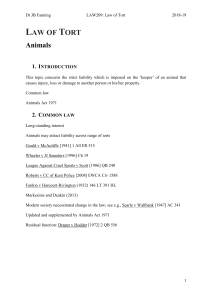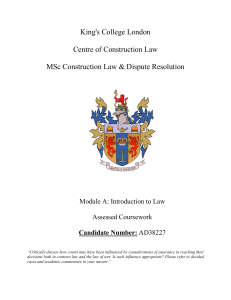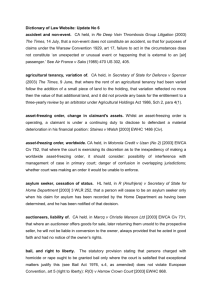tort_example_supervi..
advertisement
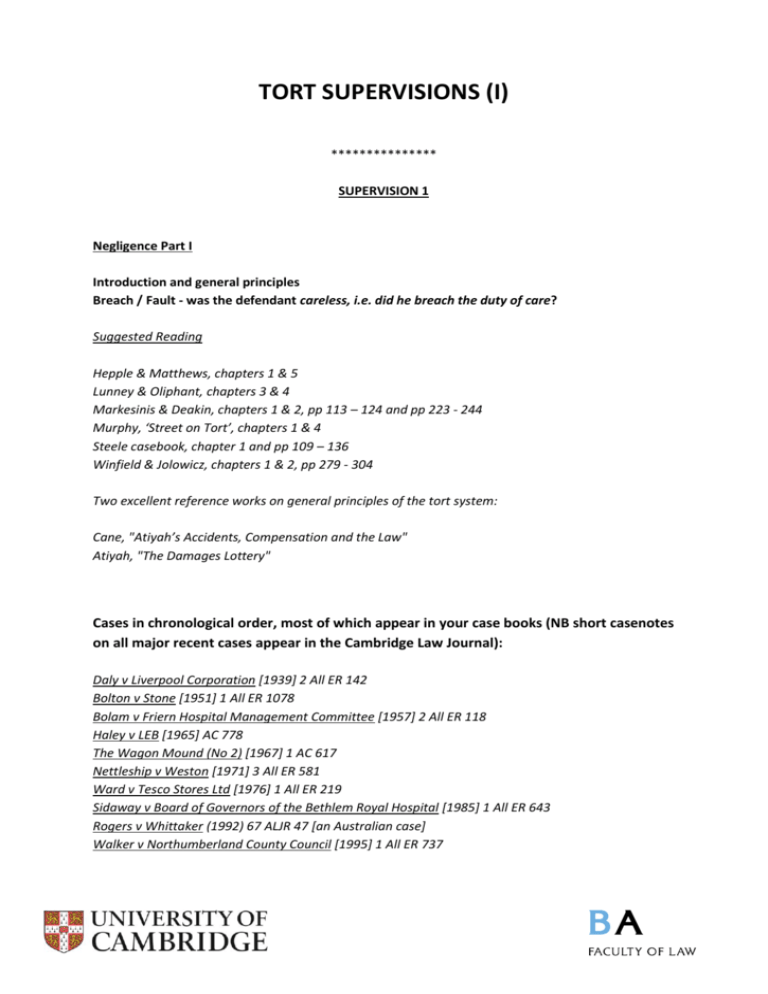
TORT SUPERVISIONS (I) *************** SUPERVISION 1 Negligence Part I Introduction and general principles Breach / Fault - was the defendant careless, i.e. did he breach the duty of care? Suggested Reading Hepple & Matthews, chapters 1 & 5 Lunney & Oliphant, chapters 3 & 4 Markesinis & Deakin, chapters 1 & 2, pp 113 – 124 and pp 223 - 244 Murphy, ‘Street on Tort’, chapters 1 & 4 Steele casebook, chapter 1 and pp 109 – 136 Winfield & Jolowicz, chapters 1 & 2, pp 279 - 304 Two excellent reference works on general principles of the tort system: Cane, "Atiyah’s Accidents, Compensation and the Law" Atiyah, "The Damages Lottery" Cases in chronological order, most of which appear in your case books (NB short casenotes on all major recent cases appear in the Cambridge Law Journal): Daly v Liverpool Corporation [1939] 2 All ER 142 Bolton v Stone [1951] 1 All ER 1078 Bolam v Friern Hospital Management Committee [1957] 2 All ER 118 Haley v LEB [1965] AC 778 The Wagon Mound (No 2) [1967] 1 AC 617 Nettleship v Weston [1971] 3 All ER 581 Ward v Tesco Stores Ltd [1976] 1 All ER 219 Sidaway v Board of Governors of the Bethlem Royal Hospital [1985] 1 All ER 643 Rogers v Whittaker (1992) 67 ALJR 47 [an Australian case] Walker v Northumberland County Council [1995] 1 All ER 737 Bolitho v City & Hackney Health Authority [1997] 4 All ER 771 (we will return to this case again, in the next supervision on Causation) Mullin v Richards [1998] 1 All ER 920 Mansfield v Weetabix Ltd [1998] 1 WLR 1263 Hatton v Sutherland [2002] 2 All ER 2 Barber v Somerset County Council [2004] 2 All ER 385 Mountford v Newlands School [2007] EWCA Civ 21 Smith v Southampton University Hospital NHS Trust [2007] EWCA Civ 387 Perry v Harris [2009] 1 WLR 19 Orchard v Lee [2009] EWCA Civ 295 Scout Association v Barnes [2010] EWCA Civ 1476 Dufosse v Melbry Events [2011] EWCA Civ 1711 Compensation Act 2006, section 1 Problems 1. (a) What does "tort" mean? (b) What are the aims and objectives of the English tort system? Do you think our system operates fairly or should it be reformed? 2. (a) A motor racing driver was involved in a highway accident in an ordinary car. He could have avoided it had he used his expert skill in braking; an ordinary driver could not. Is he liable? (b) To what extent does the English law of negligence allow the individual characteristics of the particular defendant to be taken into account so as to exonerate him? 3. (a) What criteria do the courts use when deciding whether or not conduct falls below the required standard of care? Does it make any difference if the defendant was performing a professional job at the time? (b) What is the legal position of a patient who consented to an operation, performed impeccably, which has left him paralysed due to a medically known risk of which he was not informed? 4. “Negligence is not a state of mind like ‘intention’ or ‘recklessness’. It is a failure to meet an objective standard.” Discuss. 5. There is an area of waste ground between the local golf club and the back yard of Tom's house. The ground is unstable and consequently a fence cannot be erected on it. The golf club has a "club rule" penalising any player whose ball goes on to the waste ground. In fact, the rule is broken only rarely. During the club's annual championships, Jack drives his ball right over the waste ground and into Tom's back yard where it shatters the windscreen of his car. Has the golf club been careless? 6. "What is meant by res ipsa loquitur? What is its relationship to the burden of proof?

